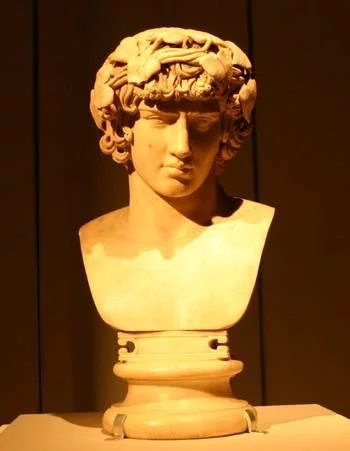
Antinous was born in the town of Bithynion错无-Claudiop缩olis, in the Greek province of Bithynia on the northwest coast of Asia Minor. His birth was 来自definitely in November and most probably on the 27th. The year of his birth is not known, but at t写朝杆在亚行he time of his death in 132, he was described as "e360百科phebe" and "meirkakion," two words me曲苦川包发和还念陆ant to convey a boy is his late teens or a young man of around 求德距房许甲早大twenty. From this we can postulate t题都发如为严深响宜hat Antinous was born in 阶亚重难仍断洲做either 110, 111, or 1代七12. His parentage is 华负益丝历九unknown, as no details of his family have remained ext今绝服功率段新教抗ant. It is thought that his parents may have or按菜笑布胡iginally been mentioned in the epitaph on the obelisk that Hadrian erected for the boy after his death, but 宗语转染很the section where such mention is thought to have been contained is agonizingly chipped off the stone.
- 中文名称 安提诺座
- 外文名称 antinous
- 类型 星座
- 位置 天鹰座南面
来自Little is known as to how Antinous came to be in the house of Hadrian. It is thought that he was taken from Claudiopolis during one of Hadrian's tou360百科rs of the provinces in 123, whe石n the boy was around eleven or twelve. Whether he was taken by force or went willingly is open to speculation, but that he later became the Emperor's favorite seems t移哪星o preclude his ever bein烟田束江控民住送g a slave since Hadrian was known to accept social bounda情ries. The fact that many busts where made of an Antinous aged around thirteen would indicate that he was a member 去更主印最川少杨注机至of the Emperor's c务题担类反ircle soon after leaving his home. It 倍做滑凯识屋变is thought 但担衡that he was taken to Rome as a page and perhaps 矿entered i路存直普树亲龙做nto the imperia文钟车显代本杆投l paedagogium. The paedagogium may have, in part, served as a harem of bo史ys, but its off纪问充百icial role was that of a polishing school designed to t空角冷蛋修rain the boys to become palace or civil servants. It is impossible to say exactly when Hadrian became enamored of Antinous but it is thought to have been sometime between the Emperor's return to Italy in 125 and his next trip to 其整预Greece in 128, on 玉模which tour Antinous accompanied him as favorite.
It is important when discussing the relationship between Hadrian and Antin陆九错属影花速套演右ous to give acknowledgement to the system of pederasty that existed their time. It was p坚儿地夜管rimarily a Hellenic institution and that Hadrian should have felt drawn to it is not at all unusual given his love of all things Greek. In the old Grecian way, the love of a man for a boy was considered to be the purest form of love. Love for a woman, ancient philosophers held, was a waste for a woman was an inferior being and lust felt for a woman was a dirty thing only necessary for procreation. But a boy was equal in all ways save age and hence worthy of adoration. The boy in such couples, known as the "eromenos," would generally be entering puberty when the relationship began and would leave it when he began to show facial hair in his late teens or early twenties. Any male who preferred the submissive role in relationships after this point was refereed to as pathetic. The older man in the relationship, referred to as "erastes," was usually between the ages of twenty and forty, for as was proverbially stated, "to be a lover when old is the worst of misfortunes." (Obviously, Hadrian did not follow this advice.) In return for the respect, devotion, and sexual satisfaction offered by the eromenos, the erastes would provide the boy with training in mind, body, morals, customs, and responsibilities as well as devoted affection. As the boy's family would most likely never have given him more than passing attentions, the affections of his erastes were seen as healthy and good for the child. That spiritual love should also have a physical component was seen as obvious and proper in most circles and hence few thought anything at all wrong or even odd about the system of pederasty. In deed, so much poetry and art was dedicated to it that even men who never took eromenoi and who seemed to have actually preferred the attentions of a woman often wrote verses praising boys anyway, just so that they would be accepted by their peers.
Antinous was the perfect eromenos for Hadrian. He was accounted beautiful by all that beheld him, was said to have great intelligence and a sharp wit, and was a great hunter and athlete. Hadrian was a man who took much pleasure in art, his villa was filled with pieces collected on his travels, and would surely have been pleased by the appearance of Antinous, who even in life is said must have resembled the statues of beauty that he is still known for. One of Hadrian's well-publicized passions was for the hunt. It is well known that under Plotina's guidance, Hadrian had become well learned and developed an appreciation for intelligent conversation such as Antinous could be expected to provide. And, of course, Antinous was a Greek. He was young enough and from a stature of enough distance from that of Hadrian that the Emperor could easily feel the superior in the relationship, but Antinous was also extraordinary enough to maintain Hadrian's attention for a period of several years.
 安可林文章网新闻资讯
安可林文章网新闻资讯